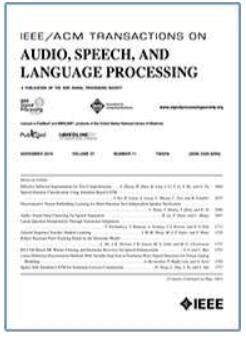论用于单声道语音增强的复值变分 U 网络的泛化能力
IF 5.1
2区 计算机科学
Q1 ACOUSTICS
IEEE/ACM Transactions on Audio, Speech, and Language Processing
Pub Date : 2024-08-15
DOI:10.1109/TASLP.2024.3444492
引用次数: 0
摘要
对于真实世界中的音频去噪系统来说,能够很好地适应不同环境是非常重要的。尤其是单通道信号,需要在不对语音清晰度产生负面影响的情况下进行高效的噪声过滤。我们之前的工作表明,概率潜空间模型与 U-Network 架构相结合,在一定程度上提高了性能和泛化能力。在此,我们将在两个不同的数据集上,并在训练-测试不匹配的情况下,进一步评估纯幅度模型和复值 U-Network 模型。通过引入与 "曲线下面积 "指标类似的基于曲线的评分,对模型的适应性进行了评估。所提出的概率潜空间模型在大多数情况下都优于其消融变体,也优于著名的比较方法,而网络规模的增加可以忽略不计。在匹配条件下,SI-SDR 可提高 0.97 dB,在不匹配条件下,SI-SDR 可提高 2.72 dB,SI-SDR 总分最高分别为 20.21 dB 和 18.71 dB。建议的稳定性分数与观察到的性能表现非常吻合,进一步验证了概率潜空间模型。本文章由计算机程序翻译,如有差异,请以英文原文为准。
On the Generalization Ability of Complex-Valued Variational U-Networks for Single-Channel Speech Enhancement
The ability to generalize well to different environments is of importance for audio de-noising systems in real-world scenarios. Especially single-channel signals require efficient noise filtering without impacting speech intelligibility negatively. Our previous work has shown that a probabilistic latent space model combined with a U-Network architecture increases performance and generalization ability to some extent. Here, we further evaluate magnitude-only, as well as complex-valued U-Network models, on two different datasets, and in a train-test mismatch scenario. Adaptability of models is evaluated by introducing a curve-based score similar to area-under-the-curve metrics. The proposed probabilistic latent space models outperform their ablated variants in most conditions, as well as well-known comparison methods, while increases in network size are negligible. Improvements of up to 0.97 dB SI-SDR in matched, and 2.72 dB SI-SDR in mismatched conditions are observed, with highest total SI-SDR scores of 20.21 dB and 18.71 dB, respectively. The proposed stability-score aligns well with observed performance behaviour, further validating the probabilistic latent space model.
求助全文
通过发布文献求助,成功后即可免费获取论文全文。
去求助
来源期刊

IEEE/ACM Transactions on Audio, Speech, and Language Processing
ACOUSTICS-ENGINEERING, ELECTRICAL & ELECTRONIC
CiteScore
11.30
自引率
11.10%
发文量
217
期刊介绍:
The IEEE/ACM Transactions on Audio, Speech, and Language Processing covers audio, speech and language processing and the sciences that support them. In audio processing: transducers, room acoustics, active sound control, human audition, analysis/synthesis/coding of music, and consumer audio. In speech processing: areas such as speech analysis, synthesis, coding, speech and speaker recognition, speech production and perception, and speech enhancement. In language processing: speech and text analysis, understanding, generation, dialog management, translation, summarization, question answering and document indexing and retrieval, as well as general language modeling.
 求助内容:
求助内容: 应助结果提醒方式:
应助结果提醒方式:


